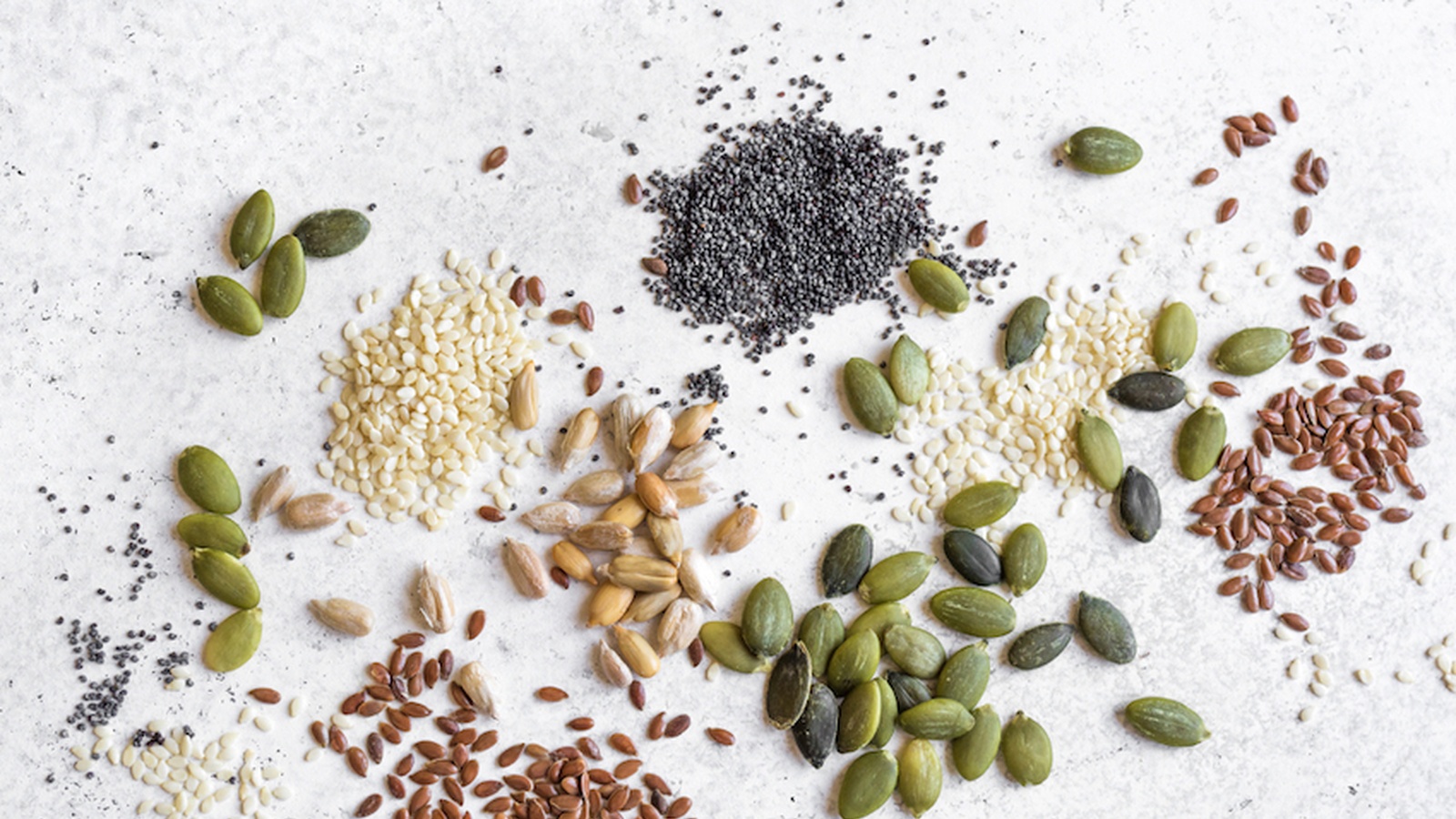10 of the Best Seeds to Eat & Why They Are Healthy!
Seeds are one of life’s greatest treasures. They’re bite-sized treats full of protein, essential fatty acids, and other vital micronutrients. We can sprout them, toast them or enjoy them fresh, sprinkled on a salad, smoothie bowl, or a snack on the go. Here’s a handful of our favorites to throw on your next meal.
1. Hemp Seeds
Harvested from one of the world’s most sustainable plants with widespread uses, hemp seeds are an incredible way to up the nutritional value of almost any dish. The seeds are known for essential fatty acids omega-6 and omega-3, a quarter of their make-up is a plant-based protein, they’re a good source of dietary fiber and are rich in Vitamin E. Hemp seed oil is becoming increasingly popular in skin care – for everything from acne to hydration concerns.
2. Chia Seeds
For one of the smallest seeds in our package-less pantry, chia comes with an impressive nutritional profile. Aztecs and Mayans praised the seed for its strengthening abilities, which comes as no surprise. The antioxidant-laden chia is a great source of dietary fiber and protein, they contain 5gm of omega-3s in a 28gm serving and contribute to our recommended daily intake of calcium, manganese, magnesium, and phosphorus. Research also suggests consumption may aid in weight loss – due to the soluble fiber expanding in the stomach, filling our bellies.
3. Pumpkin Seeds
A crowd favorite toasted on a salad, sprinkled on kitchari or folded into granola; pumpkin seeds are more than just a nice crunch to enjoy. Pumpkin seeds or pepitas – the hulled alternative – are rich in minerals the body craves for functioning; phosphorus, magnesium, iron, manganese, zinc, and copper. The seeds are also a source of Vitamin A, Vitamins B1, B2 and B3, plant-based proteins, monounsaturated fats and phytosterols – a star-studded lineup for an unassuming seed. Naturopathic doctors have also considered research that suggests the benefits of pumpkin seeds can treat prostate conditions.
4. Flaxseeds
Flaxseeds, also known as Linseeds, have been used in the human diet for over 5000 years. They are fantastic sources of dietary fiber, magnesium, potassium, and manganese, but they’re most famous for their high levels of the plant-based omega-3 essential fatty acid and phytoestrogens, known as lignans. Flaxseeds contain almost twice the level of omega-3 as fish oil, which research has shown can reduce the risk of heart disease and cancer, alongside optimal brain function. Lignans also assist in regulating estrogen levels. While flaxseeds have a delightful crunch, they are best-eaten ground for ultimate nutrient absorption.
5. Sesame Seeds
Often considered one of the world’s oldest foods, sesame seeds provide an abundance of nutrients for such a small shell. Bear with me while I go scientific on you; the densely packed seed is a fantastic source of protein, lignans, dietary fiber, monounsaturated fats, Vitamins B1 and B2, copper, magnesium, iron, zinc, calcium and phytic acid. Incredibly, they are also low in carbohydrates and cholesterol-free. The fatty make-up of a sesame seed is an incredible 82% unsaturated fatty acids, with the average oil content of the seed being 50%. Sesame is rich and varied in amino acids – making it an ideal source of plant-based protein – and is noted for antioxidant and digestive properties. And they’re tasty! Sesame can be enjoyed sprinkled in rice paper rolls, smothering bliss balls or in their tasty purified form, tahini.
6. Cumin Seeds
If you experiment with cuisines in the kitchen, you’ll be familiar with the humble cumin seed. The spice is used in everything from Mexican to Indian and Middle Eastern cooking but provides the body with more than a punchy flavor. Cumin seeds are noted for their powerful digestive abilities, as the oils present in the seed can stimulate the secretion of pancreatic enzymes –crucial for proper digestion and nutrient absorption. Additionally, research is currently underway to consider cumin’s anticancer properties – due to the seed’s free-radical scavenging tendencies. The health benefits of cumin have been noted for centuries, where Ancient Greek and Roman kitchens began by using the spice as a cheaper alternative to black pepper.
7. Pomegranate Seeds
It’s hard to get your hands on fresh pomegranate seeds, but when the seasons allow we should devour as much as possible! The perfect addition to any salad or smoothie bowl, these tart-tasting toppers are laden with beneficial antioxidants to protect our bodies against inflammation and free radical damage. Pomegranate seeds are low calorie and rich in Vitamin C – a single-serve can contain 48% of our recommended daily intake.
8. Grape Seeds
Opting for grapes with seeds inside will always enhance our nutritional profile. In fact, much of the grape’s dietary value comes from the tiny crunch inside the fleshy fruit. Grape seed extracts, rich in flavonoids known as procyanidolic oligomers, are commonly used in treating varicose veins. These same flavonoids are powerful antioxidants believed to reverse atherosclerosis and increase the antioxidant capacity of the blood. Current research is also considering how phytophenols present could halt Alzheimer’s Disease. Natural and easy, there’s no denying that grape seeds are great for you.
9. Sunflower Seeds
Another delightful salad-crunch packing a punch is the sunflower seed. The beautiful flower’s seeds are an abundant source of vital nutrients; protein, Vitamin E, Vitamins B1, B5 and B6, magnesium, selenium, phosphorus, copper, iron, folic acid, and dietary fiber. The nutrient-rich seeds actually hold many similarities to nuts – providing a high content of monounsaturated fat and arginine. Research has shown that the readily available nutrients in sunflower seeds are often in insufficient supply in the American diet – good thing they taste delicious on almost anything!
10. Quinoa
You read that right – commonly thought of as a grain, everyone’s favorite pantry staple is actually the seed of a plant called goosefoot. Quinoa is an amino-acid stuffed seed, used in everything from salads and granolas to a rice substitute in curries and stirfries. Unlike most plant-based proteins, quinoa is a complete protein – providing us with all the essential amino acids our bodies need to survive and thrive.
What are your favorite seeds to use? Let us know in the comments below!
If you haven’t already, join our free global challenge at www.GetOffTheGluten.com to receive daily recipes & health tips, access to our private group for support and inspiration, plus before and after testing to track your progress in key areas of your life such as weight, sleep, bloating, skin-conditions, mental health and more!


